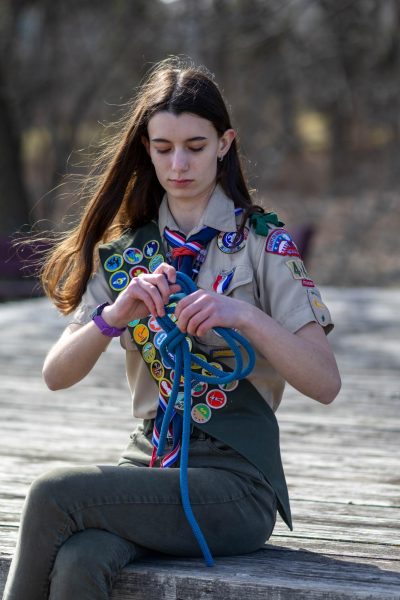Stereotyped?
Coaches, parents and athletes explore the effects of a common stereotype for Black athletes.
Junior football player Lovie Pulliam said one of the most well-known sports myths of all time is that Black people possess natural physical talent, which helps them excel in sports.
“[The stereotype] comes from the olden times because [Black people] looked bigger and muscular,” Pulliam said. “You were depicted as that, so you have to be like that nowadays, too.”
Volleyball athlete Alayna Pearson’s mom, Joi Pearson, said all stereotypes have a basis of truth.
“People of color were in manual labor for hundreds of years. If you’re in manual labor, you [will] have bigger muscles,” Joi said.
While some Black athletes at BVNW say this imagery has not affected them, Lovie said he has felt as though he needed to be bulkier in order to fit the mold.
“Where I came from in Wyandotte, Kan., it was like everyone was the same. So I was like, OK, you’re all the same. But, when I came out here, it’s like, ‘you got to look a certain way because you’re different from the rest of us,’” Lovie said.
The pressure from this expectation has impacted some of these athletes since their childhood. Lovie’s mom, Laura Pulliam, said when her kids were little, parents would set standards for her children without actually knowing them.
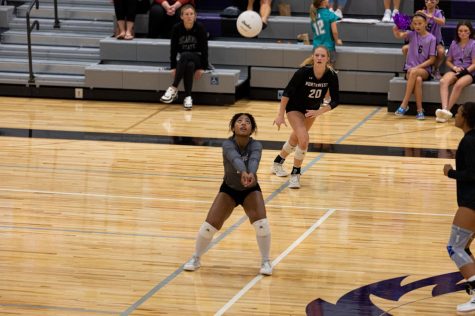
(Bailey Thompson)
“[They were] expecting our son to play basketball, [but] Lovie was very much interested in playing baseball. Some people didn’t understand that in the beginning,” Laura said. “Sometimes people don’t realize what they’re saying is a stereotype, or negative, or racist, so I just try to be kind and explain: that’s not OK.”
Similarly, sophomore volleyball player Amya Kador said when she was younger, she felt the need to be the best on the court to avoid being overlooked because of the lack of Black representation in volleyball.
“I want[ed] to go above and beyond to be noticed,” Amya said. “I was playing, and I wanted to stand out…I felt that social pressure.”
However, Amya said as she has continued to mature, some of the social pressures of playing volleyball as a Black girl have faded, as there are more Black girls on the Northwest team.
Junior football player Trey Ridley explained how despite the prejudice toward Black athletes, the prevalent representation of these athletes in football has helped him feel more accepted and welcome.
“The numbers show that it’s mainly Black athletes in professional sports,” Ridley said. “No matter your race, the football team is very accepting of Black athletes, and I have never experienced discrimination on the field from teammates, other players or coaches.”
Likewise junior volleyball player Lainie Douglas described the volleyball team as very inclusive. Due to the diversity of the team, Douglas said she has never felt as though she has been held to a higher standard because of her skin color.
“No matter [anyone’s] skin color, anyone can do anything,” Douglas said.
However, senior volleyball player Akayla Kador agreed with her sister, Amya, saying that with being Black comes the social pressure to excel in sports.
“I feel like as a Black athlete, your every movement gets micro-analyzed to the point where you feel like you can’t do anything because you’re going to be seen as angry…or not coachable,” Akayla said.
Alayna Pearson’s older sister Meiko, who is a 2020 Northwest graduate and now plays volleyball at Missouri S & T, said she found herself in a similar situation, of constantly needing to regulate herself at a young age.
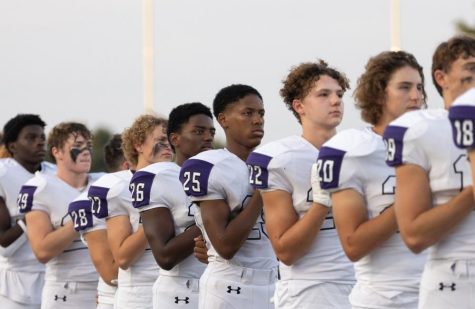
“I had always felt that I needed to keep my composure…I didn’t feel like I could show how I truly felt or show much emotion other than gratitude for just being a part of the team, or anything like that,” Meiko said. “I guess I didn’t want to be perceived as that angry girl on the team, or that girl who, you know, is asking for what she doesn’t deserve.”
Akayla continued, saying one of the biggest pressures of being a Black athlete is also the pressure you put on yourself.
“If you go into a gym and everyone looks different than you…you don’t wanna just stand out because of that; you wanna stand out because you’re good, so you push yourself more,” Akayla said.
In regard to feeling pressure to conform to the perfect standard, not all athletes feel the need to stand out in looks alone. While Lovie continues to push himself, he said he has felt some relief by choosing to focus on a growth mindset.
“Honestly, it feels like some stress is off my shoulders. I just gotta keep on going, get better every day,” Lovie said.
In contrast, senior volleyball player Alayna Pearson said she ends up standing out as she is often the only Black girl on her team.
Almost every year on her club volleyball team, Alayna said she felt disadvantaged and was not given a fair shot for certain things, which led to continual discussions with her coach.
However, that circumstance is a reality for many Black people, according to Joi Pearson.
“As a woman of color, in order to succeed in this country, no matter what area you are in, you must do 110 percent to get 50 percent…unfortunately, racism is real,” Joi said.
To elaborate, Lovie said he thinks Black athletes are held to a higher standard than their white counterparts just because of their skin color.
“It’s like, [white people] can do the bare minimum, and people don’t really care, but if it’s us [Black people], you gotta start and finish with a little bit more,” Lovie said.
Because of this, Alayna said she thinks the ‘Black athletes are better athletes’ stereotype comes from the idea that Black people are constantly being rooted against by the white majority, leading to their willingness to work even harder to accomplish something.
“We know we’re not gonna be given the benefit of the doubt, so I think we grow up knowing that we’re [always] gonna have to work just a little bit harder than everyone else,” Alayna said.
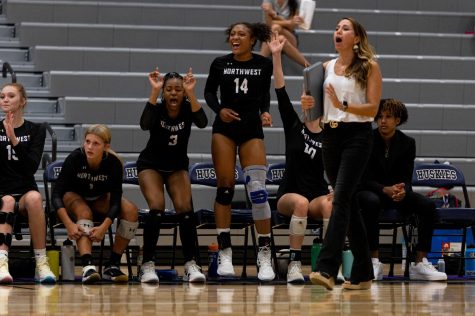
Head volleyball coach Molly Haggerty added most of what drives the stereotype is insecurity and people’s unwillingness to accept that sometimes, someone just outworks you.
“They see athletes outperforming other athletes on TV, and I think insecurities step in,” Haggerty said.
However, Haggerty also mentioned she thinks this stereotype is directly correlated to the increasing amount of diversity within athletics.
“Whenever you expose people to more diversity, you’re gonna see more intolerance,” Haggerty said.
While the football team this season has not had any known incidents of racism, head football coach Clint Rider said he works with the other coaches to stop the racism before it starts, and hopes his players do the same.
“I think that’s something that, as coaches, we have to be vigilant about,” Rider said. “I think our players have to be vigilant as well, that if they hear any stereotypical statements of anybody of any race, we want to make sure that we’re being forthright with that and stamp it out quickly.”
Rider said he has tried to avoid the intolerance that can come with additional diversity, and instead tries to create an inclusive and successful environment.
“I think that everyone, of any race and nationality, has the opportunity to excel in the game of football,” Rider said. “I don’t think there’s a difference, whether it’s physically, athletically or from a mental standpoint. I think all those things are based upon an individual’s ability to be able to do their job well.”
Though the stereotype can cause insecurity for those who do not meet the standard, Meiko said to ignore the pressure it brings and keep focusing on bettering yourself.
“Don’t let anybody tell you, you’re less than what you really are…You can get anywhere as long as you’re competent, and yourself and believe in yourself, regardless of whatever anybody else tells you,” Meiko said.
Along those lines, Laura Pulliam advised parents and coaches to not feed into the stereotype and allow their children to succeed.
“I think we should just let kids figure out what they want to do and maybe not push our dreams and beliefs on them,” Laura said.
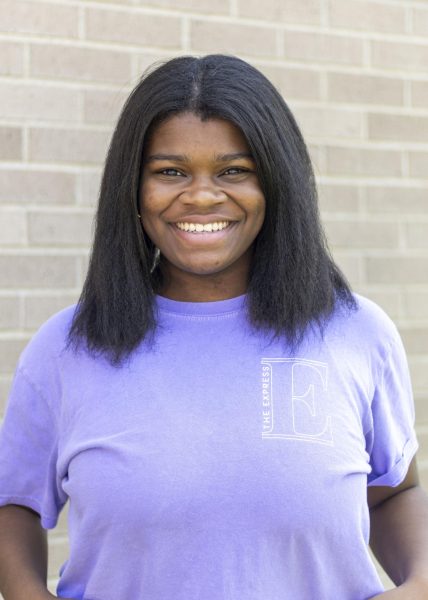
Harper is a senior and a writer for the “The Express.” This is her second year on staff. Outside of newspaper, Harper runs track, plays high school soccer, and manages the football and basketball teams. In her free time, Harper enjoys watching horror movies, going to Quiktrip, and late-night car rides. Harper is excited to spend her final year writing for “The Express” along with her best friends.
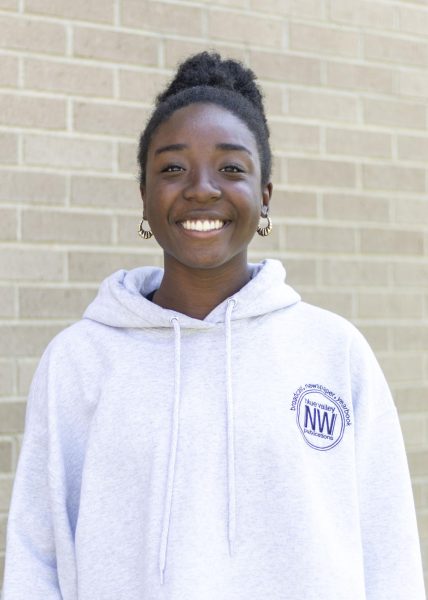
Saraphina Wambi is a senior and a writer for “The Express” as well as the host of the “BVNWspeaks” podcast. This is her second year on staff and outside of newspaper, Saraphina is student body President, BSU President, Model UN President, SNHS president, Gold Out KC (NW chapter) founder and president, and involved in girl’s tennis, HOSA, Mental Health Board, BVNW Ambassadors, NHS, Quill and Scroll, Chamber Symphony, Tri-M, and Medical Club. In her free time she likes to hang out with her friends, read, and play tennis. She is extremely grateful for the opportunity to write for “The Express” and cannot wait to see what is in store for the year!
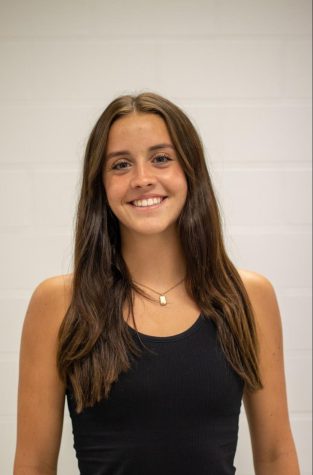
Bailey Thompson is a senior and Chief Photographer for “The Express.” Outside of staff, Bailey is in NHS, NAHS and a part of the girls soccer team. She also enjoys spending time with her friends and family, as well as binge-watching TV shows and movies on Netflix. Bailey is excited for what the future has in store for her and is ready for the next step.



